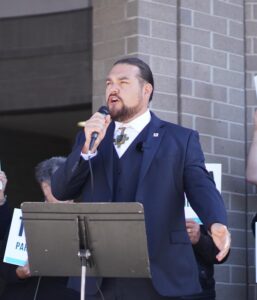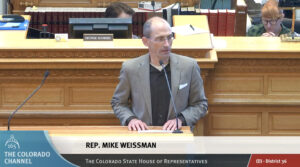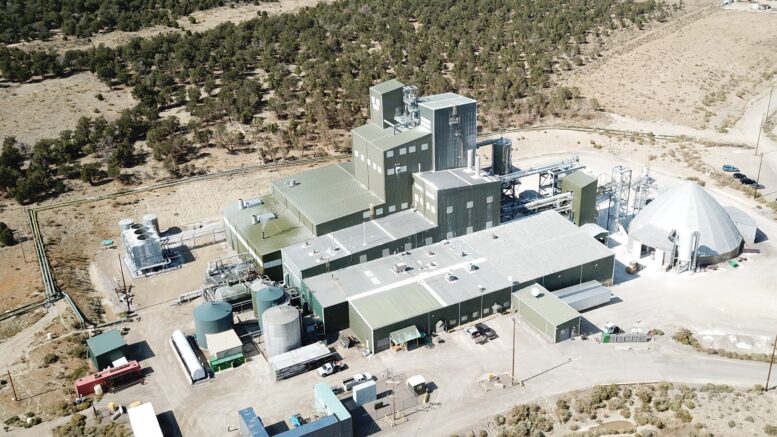Three years after passing the Environmental Justice Act to target polluters throughout Colorado, environmentally focused legislative Democrats returned Thursday with an ideologically similar bill that has a new target — a state government they claim is not following their orders.
House Bill 1339, which passed its first committee on a party-line vote, would require the Colorado Air Quality Control Commission to rewrite regulations it approved in two rulemakings last year and eliminate concessions made in them to business operators.
Sponsoring Democratic Reps. Mike Weissman of Aurora and Manny Rutinel of Commerce City, as well as a litany of environmental and neighborhood groups, explained that the bill springs from the “betrayal” they feel from AQCC decisions in May and September. The first created rules that set up lesser restrictions for emitters in disproportionately impacted communities than in more disadvantaged cumulatively impacted communities, while the second sought to balance new requirements on large manufacturing facilities with a desire to ensure the rules aren’t so strict that they send jobs outside the state.
HB 1339 supporters argued that governor-appointed AQCC members went so far as to ignore the mandates in the 2021 Environmental Justice Act and must be forced by this new bill to rewrite the new rules to fall into compliance with that law. Ean Thomas Tafoya, Colorado state director for GreenLatinos, accused the commission of being “unaccountable” and said that “the administrative leadership has joined forces with the polluters against our will to push loopholes.”

Ean Thomas Taffy, Colorado state director for GreenLatinos
An environmental battle between legislators and administration
“This bill really comes down to the appropriate separation of powers and the Legislature’s ability to dictate policy to the executive branch,” said former Sen. Mike Foote, representing GreenLatinos and 350 Colorado at the House Energy & Environment Committee hearing. “When the executive branch isn’t implementing policy, it’s time for the Legislature to step in … The executive branch is not getting the message. The General Assembly should help them do that.”
Business leaders and executives from two key state agencies involved with the rulemakings — the Colorado Air Pollution Control Division and the Colorado Energy Office — said the new regulations proposed by HB 1339 are unattainable and fiscally unreasonable. Not just that, they represent a complete undercutting of policy that was developed via stakeholding over an 18-month period, meant to soothe a few activist groups who were hurt that commissioners didn’t give them everything they wanted, opponents said.
In the case of the Greenhouse Gas and Energy Management for Manufacturing Phase 2 (GEMM 2) regulations, HB 1339 sets a sector cap of 97 million metric tons of allowable carbon dioxide emissions from 2025-30, nixing growth exemptions the AQCC allowed for factories like Molson Coors and Natural Soda where significant expansions are underway. The bill also prohibits manufacturers from paying into a fund to meet cleanup obligations if onsite improvements were not economically feasible — a compliance option that the AQCC added to ensure it did not do economic harm while trying to improve the environment.

Molson Coors is undertaking a significant expansion of its Golden plant — growth for which the Colorado Air Quality Control Commission accounted when creating new emissions limits for the facility.
State agencies side with business groups
In the case of DIC rules, the bill requires regulations to be as stringent in those areas as in CICs, where multiple conditions such as high levels of pollutions, poverty and minority population may exist, rather than just a single condition that qualifies an area as a DIC. It also requires companies to meet enhanced modeling and monitoring requirements on all new and modified sources of emissions, and it requires accounting for and cleaning up of a greater range of toxic air contaminants.
Officials from several manufacturers, such as Leprino Foods and Microchip Technologies, said they’ve begun implementing improvements to meet the standards set by the AQCC and now would be forced to meet new goals even before the rules are fully in place. Selia Perez, general manager of Cargill’s Fort Morgan plant, said in provided testimony that the changes would undermine all the collaborative work that went into GEMM 2 rules, and business leaders said such a move would erode all trust in the rulemaking process.
Colorado Energy Office Executive Director Will Toor and APCD Director Michael Ogletree also opposed the change in rules, saying the costly regulatory upgrades would not help the state reach its emissions goals faster and would be unworkable in some cases. Ogletree insisted the final rules are in compliance with the Environmental Justice Act and said HB 1339 destroys any balance the officials tried to achieve to ensure economic prosperity of targeted communities by keeping employers there.
“While HB 1339 shares our goal to improve air quality, it addresses issues already decided through a lengthy stakeholding process,” Ogletree said in testimony. “During the rulemaking process, we heard it was important to regulate businesses in this state, not just relocate them and their emissions.”
Changes to environmental bill
After delaying the first hearing on HB 1339 for roughly a month, Weissman offered committee members a significantly rewritten bill with two major changes.

Colorado state Rep. Mike Weissman speaks on the House floor in May 2023.
He removed efforts to add a DIC resident and a climate scientist to the AQCC, saying he was bowing to concerns from labor groups that their lone voice on the commission would be diluted with the addition of new members. And he added a rewrite of the DIC rules to what originally was a bill targeting just the GEMM 2 rules.
Committee Democrats, including five members who voted for the Environmental Justice Act in 2021, agreed with bill proponents that Gov. Jared Polis’ administration was not implementing that act in the way legislators prescribed it. They seemed to agree too with the statement of Alex DeGolia, Environmental Defense Fund director of state legislative and regulatory affairs, that while they have passed strong laws, Colorado has developed “an implementation problem” in cases like GEMM 2 rules.
“Continue to move the bar”
“The Environmental Justice Act of 2021 was supposed to be a beacon of hope — a promise to our communities that their voices would be heard and their health taken care of,” Rutinel said before the 9-4 vote to move HB 1339 to the House Appropriations Committee. “But what we have witnessed in the last year of rulemaking was a betrayal of that promise.”
Business leaders pushed back that they are the ones who are being betrayed after an appointed commission assented to some but nowhere near all their wishes in rulemakings and laid out compliance paths that still would be costly but also would be doable. Now they must rethink whether to move expansions or portions of existing work elsewhere, leaving communities that the bill supposedly is trying to help with fewer jobs and economic opportunities while producing emissions in states with fewer regulations.
“You continue to move the bar faster than the agencies can move,” said Christy Woodward, a regulatory affairs specialist for the Colorado Oil & Gas Association and the Colorado Chamber of Commerce, noting the 33 rulemakings in which she’s participated in five years. “HB 1339 is a list of things that a few select participants could not convince the commissioners to adopt.”
